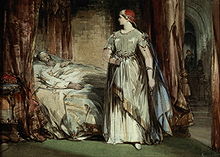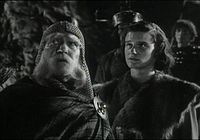- King Duncan
-
This article is about the character in Shakespeare's Macbeth. For other uses, see King Duncan (disambiguation).
King Duncan 
Lady Macbeth at the bedside of King Duncan, (Lady Macbeth by George Cattermole, 1850)Creator William Shakespeare Play Macbeth Date Uncertain, c.1603–1607 Source Holinshed's Chronicles Family Malcolm, elder son and heir to the throne
Donalbain, younger son
Macbeth, cousinRole Father-figure
Represents moral order
Macbeth's murder victimQuote This castle hath a pleasant sent; the air / Nimbly and sweetly recommends itself / Unto our gentle senses. (1.6) See also Duncan I of Scotland King Duncan is a fictional character in Shakespeare's Macbeth. He is the father of two youthful sons (Malcolm and Donalbain), and the victim of a well-plotted regicide in a power grab by his trusted captain Macbeth. The origin of the character lies in a narrative of the historical Duncan I of Scotland in Raphael Holinshed's 1587 The Chronicles of England, Scotland, and Ireland, a history of Britain familiar to Shakespeare and his contemporaries. Unlike Holinshed's incompetent King Duncan (who is credited in the narrative with a "feeble and slothful administration"), Shakespeare's King Duncan is crafted as a sensitive, insightful, and generous father-figure whose murder grieves Scotland and is accounted the cause of turmoil in the natural world.
Contents
Analysis
King Duncan is a father-figure who is generous but firm ("No more that Thane of Cawdor shall deceive / Our bosom interest. Go pronouce his present death / And with his former title greet Macbeth."[1]), insightful ("There's no art / To find the mind's construction in the face."[2]), and sensitive ("This castle hath a pleasant seat. The air / Nimbly and sweetly recommends itself / Unto our gentle senses."[3]). However, the role is full of irony; he is completely deceived in the intents of Macbeth. Although a modern reader may view Duncan as an incompetent monarch in this respect, Duncan represents moral order within the play and his murder signals the onset of chaos.
Film and television performances
Erskine Sanford as King Duncan with Roddy McDowall as Malcolm in Orson Welles' controversial Macbeth (1948)
Film
Duncan has been played in film adaptations of the play by Anthony Head in 2008, Gary Sweet in 2006, and Tom Reid in 2003. Javier Ronceros performed the role in Dogg's Hamlet, Cahoot's Macbeth (2005) and John Little in Macbeth: The Comedy (2001). Christopher McCann played Duncan in Macbeth in Manhattan (1999). Greg Korin, John Corvin, and Antti Litja played the role in 1998, 1997, and 1987 respectively. Erskine Sanford played King Duncan in Orson Welles' 1948 Macbeth and Louis Northop in a 1946 film adaptation. Spottiswoode Aitken and Charles Kent both played Duncan in silent versions of Macbeth in 1916 and 1908 (the first screen version of the play).
In Orson Welles' 1948 film adaptation of Macbeth, the role of King Duncan is reduced. 1.2 is cut entirely as well as generous portions of 1.4. King Duncan is seen briefly in 1.6 as he enters Macbeth's castle amid considerable pomp. The top of 1.4 with its description of Cawdor's execution has been transplanted to this scene. Banquo's "temple-haunting martlet" speech is given to Duncan. Duncan is later seen asleep in bed for a fleeting moment as Lady Macbeth slinks about in the chamber's shadows. Donalbain has been cut from the film, leaving Duncan with just one son, Malcolm.
Television
Vincent Regan played King Duncan in "ShakespeaRe-Told" Macbeth (2005), Ray Winstone in Macbeth on the Estate (1997), Laurence Payne in "Shakespeare: The Animated Tales" Macbeth (1992), Griffith Jones in A Performance of Macbeth (1979), and Jacques Mauclair in Macbett (1974), Kevin Coughlin on the "Goodyear Television Playhouse" (1955), and Lee Patterson on the "Douglas Fairbanks, Jr., Presents" Dream Stuff (1954). Other television performers of the role include Philip Madoc (1998), Mark Dignam (1983), Powys Thomas (1961), Malcolm Keen (1960), Leo G. Carroll (1949), Arthur Wontner (1949).
References
Bibliography
- Bevington, David, ed., and William Shakespeare. Four Tragedies. Bantam, 1988.
William Shakespeare's Macbeth Characters - Macbeth
- Lady Macbeth
- Banquo
- Macduff
- King Duncan
Scenes and speeches - Sleepwalking Scene (5.1)
- "Tomorrow and tomorrow and tomorrow"
Literary adaptations - Wyrd Sisters
- The Third Witch
- The Tragedy of Macbeth Part II
Film and theatre adaptations - MacBird!
- MacHomer
- Throne of Blood
- Men of Respect
- Scotland, PA
- Maqbool
- Macbeth (opera)
- Macbeth (Bloch)
- uMabatha
- Sleep No More 2003 Punchdrunk Production
- Sleep No More (2009 play)
- Sleep No More (2011 play)
Macbeth on film Categories:- Fictional characters introduced in 1603
- Male Shakespearean characters
- Characters in Macbeth
- Fictional Scottish people
Wikimedia Foundation. 2010.

